Welcome to my political blog. I had originally written a very nice, intelligent post as an opener, but my computer decided to have a meltdown and it was eaten by a strange error which shut down Windows and left me wishing that I had been born in 10th century Constantinople. [Don't we all wish that, regardless of technological disasters?] Oh, well. It's the price one pays for technology--having one's brilliant ideas sucked into the oblivion of cyberspace, only to be read by the snoops at Google and maybe the NSA, and never by one's intended audience.
By now, you are probably wondering what on earth this blog will become. Will it be another outlet for the rantings of yet another culture warrior throwback whose strenuous advocacies of absolute monarchy, traditionaly Christianity, nationalism, modest dress, and censorship place him somewhere between the luney bin and left field (no political direction meant there, of course)? Will it ooze the obnoxious odium of an obdurant obscurist (who is very proud of his achievements as an able aliterationist)? No, although there will still be comic relief.
What I would like to do here is simply investigate Orthodox Christian political theory--past, present, and future. We'll be looking at history, examining the ways in which Christians have viewed their relation to the state and the political process in the Roman, Byzantine, and Russian Empires (and elsewhere). We'll also be discussing how Orthodox Christians view and carry out their civic duties. Finally, we'll be speculating about future trends.
The model for our research, discussion, and speculation will be the slogan "Orthodoxy, Autocracy, and Nationality." This slogan was first used in the late 19th century Russian Empire and became a sort of operative phrase for conservatives and a rallying cry for the masses.
"Orthodoxy" refers to the Orthodox Christianity of the Russian Orthodox Church, the state church of the Russian Empire.
"Autocracy" refers to the form of government in the empire--that of a more-or-less absolute, beaurocratic monarchy.
The term "nationality," however, is not so precisely defined. In Russian, natsional'nost', does not refer to exclusively Russian ethnic nationalism. Rather, it suggests an imperial consciousness--patriotism and civic duty. Going back in time to the Byzantine Empire where the slogan was never used outright but was still the foundation of Byzantine identity, "nationality" roughly corresponds to the Greek term "ecumen," or the inhabited, civilized world. This is, of course, the part of the world under the real or symbolic authority of the Emperor, who is himself a symbol of God's authority. [As the Byzantines would say, "There is one God in Heaven, and one Emperor on the earth.] The earth, then, is divided in two parts--civilized (Christian, under the Emperor) and barbarian (Pagan and not under the imperial order). I'll be going into this more in later posts.
For purposes of this blog, the slogan's three parts take on broader meanings:
Orthodoxy = Orthodox Christianity, whatever the jurisdiction (Russian, Greek, etc.).
Autocracy = Government. By this understand a government of order, dedicated to upholding and spreading the Orthodox Christian faith. It does not have to be an autocratic monarchy. It could be a constitutional monarchy where the monarch still has some clout and authority. However, it should be noted that Orthodox Christian history and political thought are almost inseparably bound to some kind of monarchial order and government. Even in the first 300 years of Church history, when there were persecutions by pagan Roman emperors, it was still unthinkable that there should be emperors no longer. Ancient Athens and Medieval Novgorod may have been democracies, but they were in the tiny minority. Still, non-monarchial forms of government are game for investigation and discussion, especially since now the only Orthodox living under an actual monarch (who has authority to make and enforce laws) are in shrinking corners of the world with little history of Orthodox Christian civilization.
Nationality = Civilzation, as opposed to barbarism. It is easiest to difine what this term has meant, historically, and means today in light of the other two. Society is civilized if 1) the Church and State are acting in symphony and 2) the government, obedient to its conscience, expressed by the Church, works for the good of its citizens. Of course, since this is the most complex term of the slogan, it merits further explanation and discussion.
I am a historian with a master's degree in Russian studies. I'm by no means an expert on any one topic, but I know a little about a lot of things and have, as a participant in American democracy, done a lot of thinking and questioning. I'm interested in knowing more about how Orthodox Christians have thought about politics and been involved in politics historically and what they are thinking and how they are participating in the political process today. I also have speculative questions on my mind such as: What would be the ideal form of government, from an Orthodox Christian persepective? How can we make such a government a reality? Will there be a resurgence of Orthodox autocracy in the future? And how will things come to play out in the days before and during the reign of Antichrist? These questions are fascinating to me. They're not the only things I think about (see my other two blogs), but they're something I felt merited deeper investigation and discussion. So, without further ado, let's get started.
Subscribe to:
Post Comments (Atom)
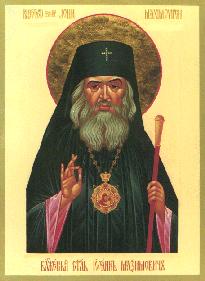

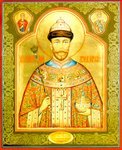
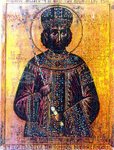

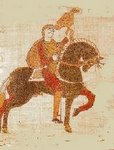
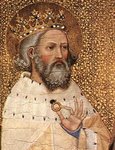
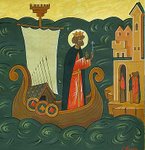

4 comments:
I am excited about reading more from this blog. Fr. Seraphim Rose sort of confused me when he started talking about Christian monarchy. I am a recent convert to Orthodoxy so of course I'm interested in learning more. Perhaps you will shed some more light on the subject?
I am eager to hear what people in the know will say to your questions. It's hard for me to imagine anything close to a uniform political theory coming out of a study of Orthodoxy and politics.
Of particular interest to me is the effect of so many Protestant converts on Orthodoxy and politics is the U.S. My church, located in the Bible Belt, is right-wing in its politics. These political views are often backed up through quoting the Fathers.
Such a blend of religion and the world lends itself to awkward moments in our discussions and arguments. For instance, your mentioning the Antichrist. I suddenly get the feeling we're trying to rationalize the irrational, scholasticizing mystery.
I'm just beginning to think seriously about this. Are there any good books you'd recommend? ht
Who knows where to download XRumer 5.0 Palladium?
Help, please. All recommend this program to effectively advertise on the Internet, this is the best program!
The post was good until you asked your question about the antichrist. You lost all credibility.
Post a Comment